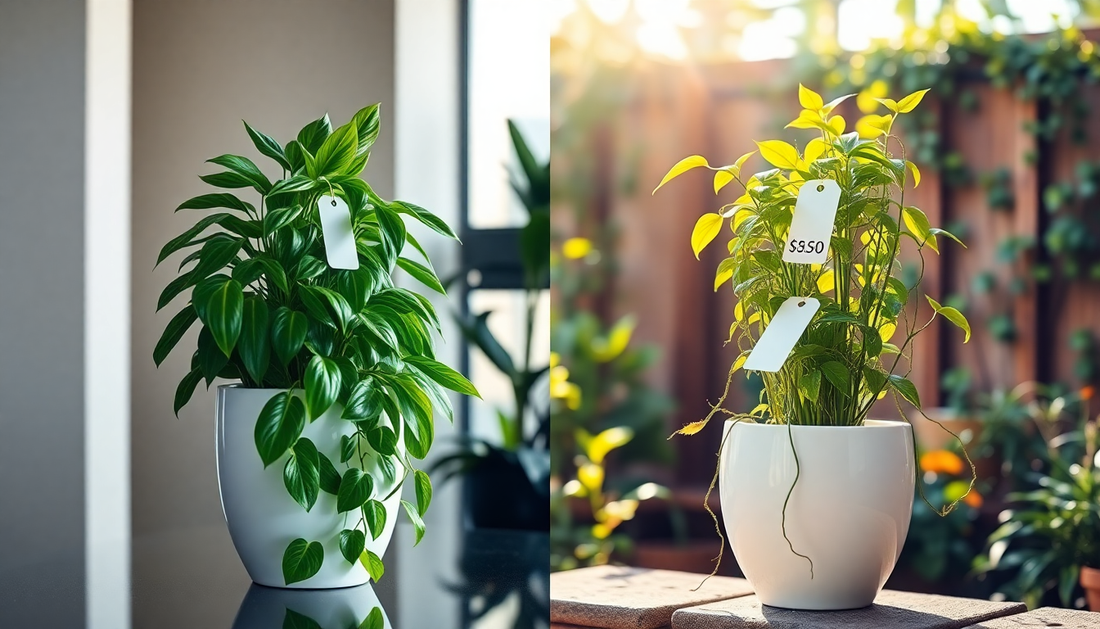
Compare Prices: Indoor vs Outdoor Money Plants
As the popularity of indoor plants continues to grow, the money plant has emerged as a favorite among urban dwellers and plant enthusiasts alike. Known for its air-purifying properties and easy-to-care-for nature, the money plant has become a staple in many homes and offices. However, with the rise in demand, the prices of these plants have also seen a significant variation, leaving many consumers wondering whether to opt for an indoor or outdoor money plant.
In this comprehensive blog post, we'll explore the key differences between indoor and outdoor money plants, their respective prices, and help you make an informed decision on which one to choose for your space.
Understanding the Money Plant
The money plant, scientifically known as Epipremnum aureum, is a trailing vine that can thrive in a variety of environments. It's a popular choice for its ability to purify the air, its low-maintenance requirements, and its versatility in terms of placement.
Money plants can be grown both indoors and outdoors, and each environment offers its own unique benefits and challenges. Let's dive deeper into the differences between the two.
Indoor Money Plants
Indoor money plants are a popular choice for those living in apartments or homes with limited outdoor space. These plants are known for their ability to adapt to a wide range of lighting conditions, making them an excellent choice for areas with limited natural light.
Advantages of Indoor Money Plants
- Air Purification: Indoor money plants are highly effective at removing toxins and improving air quality, making them a great addition to any indoor space.
- Low Maintenance: Compared to their outdoor counterparts, indoor money plants require less frequent watering and are generally easier to care for.
- Space-Saving: Their trailing vines can be trained to climb up walls or hang from shelves, making them a space-efficient option for small living spaces.
Disadvantages of Indoor Money Plants
- Limited Growth: Indoor money plants may not reach the same size and lushness as their outdoor counterparts, as they are limited by the available space and light.
- Susceptibility to Pests: Indoor money plants can be more prone to pests and diseases, such as spider mites or fungal infections, due to the controlled environment.
- Higher Prices: Indoor money plants are often more expensive than their outdoor counterparts, as they require more specialized care and attention.
Outdoor Money Plants
Outdoor money plants, on the other hand, are often grown in gardens, balconies, or patios, where they can thrive in natural sunlight and a more open environment.
Advantages of Outdoor Money Plants
- Faster Growth: Outdoor money plants generally grow larger and more lush than their indoor counterparts, as they have access to more natural light and space.
- Hardier Nature: Outdoor money plants are often more resilient to pests and diseases, as they are exposed to a wider range of environmental conditions.
- Lower Prices: Outdoor money plants are typically more affordable than indoor varieties, as they require less specialized care and attention.
Disadvantages of Outdoor Money Plants
- Susceptibility to Weather: Outdoor money plants are more vulnerable to harsh weather conditions, such as heavy rain, strong winds, or extreme temperatures, which can damage the plant.
- Maintenance Requirements: Outdoor money plants may require more frequent watering, pruning, and protection from pests and diseases, depending on the local climate and environment.
- Limited Placement: Outdoor money plants are limited to areas with sufficient sunlight and space, which may not be available in all outdoor settings.
Comparing Prices
Now that we've explored the key differences between indoor and outdoor money plants, let's take a closer look at the price variations.
According to our research, the average price of an indoor money plant in Bangalore ranges from ₹300 to ₹1,000, depending on the size, pot, and brand. On the other hand, the average price of an outdoor money plant in Bangalore ranges from ₹200 to ₹500.
It's important to note that these prices can fluctuate based on factors such as seasonality, availability, and the specific seller or nursery. Additionally, bulk orders or discounts may be available for both indoor and outdoor money plants, which can further impact the overall cost.
Choosing the Right Money Plant for You
When deciding between an indoor or outdoor money plant, it's essential to consider your specific needs, available space, and budget. If you have limited indoor space and are looking for a low-maintenance option, an indoor money plant may be the better choice. However, if you have access to outdoor space and are looking for a more affordable and lush option, an outdoor money plant may be the way to go.
Ultimately, the decision should be based on your personal preferences, the environment in which the plant will be placed, and your budget. By weighing the pros and cons of each option, you can make an informed decision and enjoy the benefits of the money plant in your home or garden.
Conclusion
The money plant is a versatile and popular choice for both indoor and outdoor spaces. While indoor money plants offer the benefits of air purification and low maintenance, outdoor money plants can provide a more lush and affordable option. By understanding the key differences and comparing prices, you can make an informed decision that best suits your needs and budget.
Whether you choose an indoor or outdoor money plant, you can enjoy the beauty, air-purifying properties, and calming presence of this beloved plant in your living space. Happy gardening!







No comments